Yirgacheffe coffee is from southern Ethiopia and is one of the best coffees in the world. In this post, you’ll learn about Ethiopian Yirgacheffe: how to roast, brew, and pair this delicious drink.
Ethiopian Yirgacheffe coffee is considered one of the best coffees in the world. It comes from the town of Yirga Chefe in southern Ethiopia. The variety, terroir, and processing method creates an organic coffee with a fruit-forward flavor that is sought by many coffee lovers.
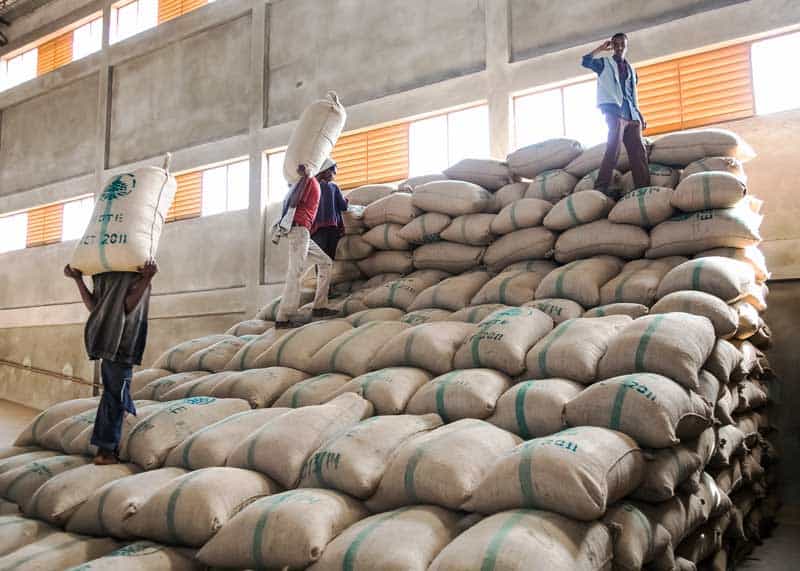
Yirgacheffe coffee plants thrive in Ethiopia’s tropical climate. They rely on tropical forests to protect coffee plants. Coffee farming is the number one trade in Yirgacheffe due to the abundance of crops and the significant worldwide popularity of Yirgacheffe coffee.
Avid coffee fans enjoy the Yirgacheffe bean’s unique fruity flavor that changes drastically depending on the processing and brewing technique used.
This guide includes information for any coffee drinker looking to expand their knowledge of the history, flavors, and brewing techniques of Yirgacheffe coffee.
Origin and History of Yirgacheffe Coffee
In Ethiopia, coffee is king. There are over 45,000 coffee farmers in Yirgacheffe alone, producing endless varieties and roasts of this gourmet coffee bean.
The harvesting season in Ethiopia lasts from October through April and produces an estimated 7.25 million 132-pound bags each year.
The Yirgacheffe coffee bean comes from the Sidoma region of southern Ethiopia, specifically the mountainous town of Yirgacheffe (also spelled Yirgachefe, Yergacheffe, or Yirga Chefe).
The coffee plants grow easily in this area because of the high elevation, healthy soil, and warm, tropical weather.
It is estimated that coffee was discovered around 850 AD, leading many to consider this region the birthplace of coffee. There are many legends about the discovery of coffee in Yirgacheffe.
Learn more about coffee in Ethiopia.
Yirgacheffe was the first region to use a wet-processing mill, pushing Ethiopia to the coffee industry’s front due to this modern technique.
However, the early 2000s saw a great deal of political strife in Ethiopia, causing the price of coffee to drop dramatically in the last 20 years.
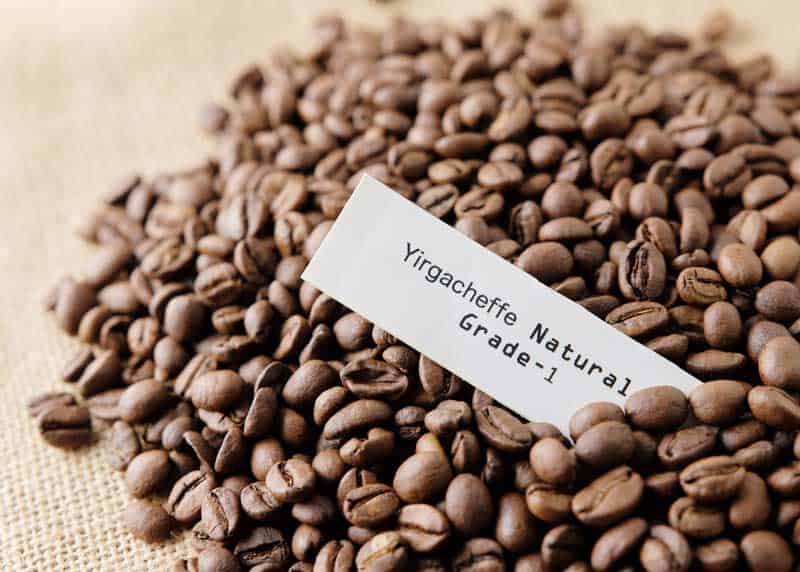
Unique Flavor Notes
The flavor and body of Ethiopian Yirgacheffe coffee is truly unique. Coffee drinkers often describe it as responsible for the divide between coffee connoisseurs and the average coffee drinker because of its distinctive flavor.
Those who dislike strong, full-bodied cups of coffee find the lightness of Yirgacheffe appealing.
The unique, intense fruit flavor is due to the high elevation of the area, which tends to produce a harder bean and the wet-processing methods originated in Yirgacheffe.
Some of the descriptions of Ethiopian Yirgacheffe flavor include:
- Fruit forward (wildberry, melon, and peach)
- Floral (lavender and lemongrass)
- A tea-like aroma that is citrus forward
- Light, soft chocolatey notes
- A hint of wine
- Nutty
- Delicate light to medium body
At a loss for how to describe your coffee? Here are 241 flavorful words to describe coffee.
Visiting a Yirgacheffe Coffee Farm
Here’s a glimpse of a coffee farm in Yirgacheffe.
Wet Processing Yirgcheffe Coffee
Ethiopian coffee is able to be processed without chemicals because of the climate. Beans can be developed through wet processing or natural processing.
When processed naturally, coffee beans are harvested and then immediately dried in the sun, which results in a dry, earthy flavor. For Yirgacheffe beans, natural processing brings out the bitterness of the cherry.
Wet processing was developed in Ethiopia in the 1970s and is considered a more modern technique and is essential to emphasize the clear profile of traditional Ethiopian Yirgacheffe beans.
Wet processing is also sometimes referred to as washed coffee because the process requires thorough washing. This intense cleaning of the coffee beans before they are dried produces a clear, fruity flavor.
The steps involved in wet-processing Yirgacheffe beans include:
- Harvesting: The beans should be harvested while they are still fresh and moist
- Cleaning: Remove the skin and pulp of the cherry from the bean
- Soaking: The cleaned beans should soak in a large tank immediately after being picked
- Sorting: Remove the dry beans that float to the top of the tank as they will change the flavor profile
- Drying: The cleaned beans can be dried in a machine or in the sun
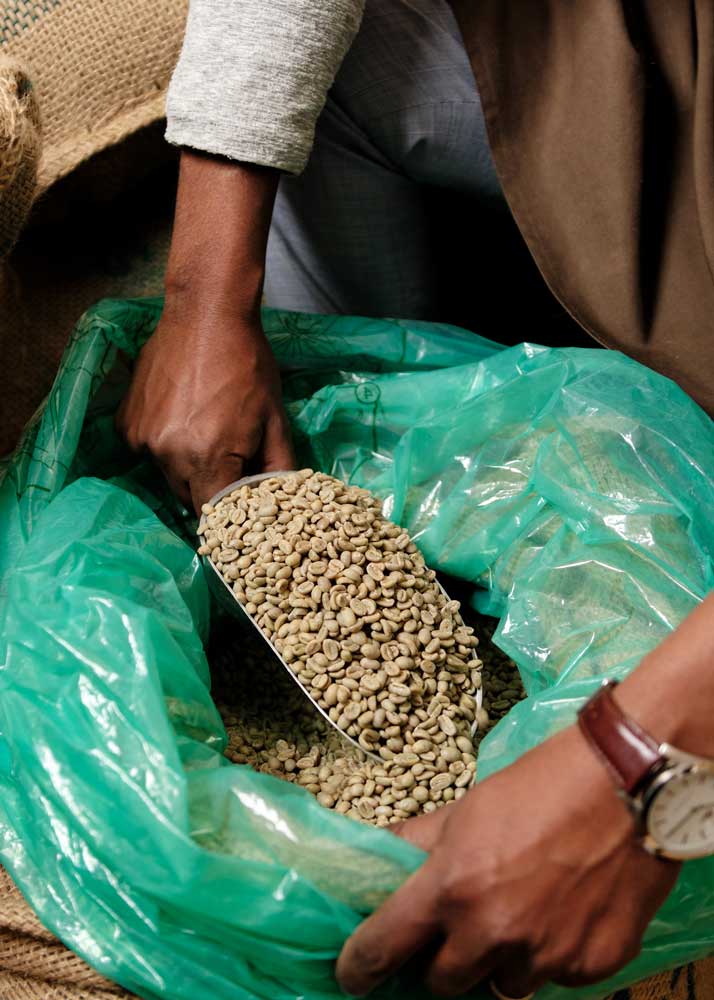
Drinking Yirgacheffe Coffee
Now let’s get down to it. In this section, we cover roasting, brewing, and pairing your Yirgacheffe beans and coffee.
Roasting Yirgacheffe Coffee Beans
It is essential to take special care when roasting Yirgacheffe coffee because the beans are dense and small, and they roast differently from other coffee.
Roasters should be sure to use low heat as the beans are delicate, and over-roasting can result in a bitter taste.
Most Yirgacheffe coffee beans are sold as a medium roast, though light roasts are also popular. A medium roast will provide the fullest flavors and richest aromas.
Here’s more about the 5 types of coffee roasts.
More reading: How many cups of coffee in a pound?
Best Way to Brew Yirgacheffe
Brewing specialty coffee is an art and a practice that many coffee drinkers find to be a relaxing ritual in the morning.
In Ethiopia, brewing and serving coffee is respected as a slow, intentional process reserved for close friends. A typical brewing ceremony in Ethiopia can last for more than 2 hours.
The Yirgacheffe bean should be brewed from a fresh-roasted and fresh-ground bean to maintain the best flavor profile.
- It is not recommended to serve milk with this coffee as it dulls the acidity of the bean.
- Adding sugar can heighten the flavor profile, but some are purists and prefer it without any.
This coffee bean is known for being able to be brewed hot or cold.
Some coffee fans say that the cold brewing technique through a metal filter is the most ideal brewing process to highlight Yirgacheffe’s signature floral and citrus flavors.
When brewing with hot water, it is important not to brew too long, or the coffee will become “over-extracted,” resulting in the loss of lighter flavors.
Pour Over (like Chemex): Pour over coffee is a method of brewing coffee by pouring hot water over the grounds. The grounds are held in a coffee filter, allowing the water to drain through into a cup or container. Using the pour-over method to brew Yirgacheffe coffee will produce a lighter-bodied coffee with a more intense flavor.
- Cold Brew: Cold brewing coffee involves combining coffee grounds with water and letting the grounds steep overnight, creating a concentrated brew that can be strained and served over ice. It is important to grind the coffee coarsely for this method. Using a cold brew method will illuminate the fruity elements of Yirgacheffe coffee.
- French Press: A French press is a glass cylinder with a metal plunger and filter. The plunger is used to press hot water into the ground coffee while filtering. Using a French press to brew Yirgacheffe coffee will produce a milder flavor with a heavier body.
Read more about how to make coffee.
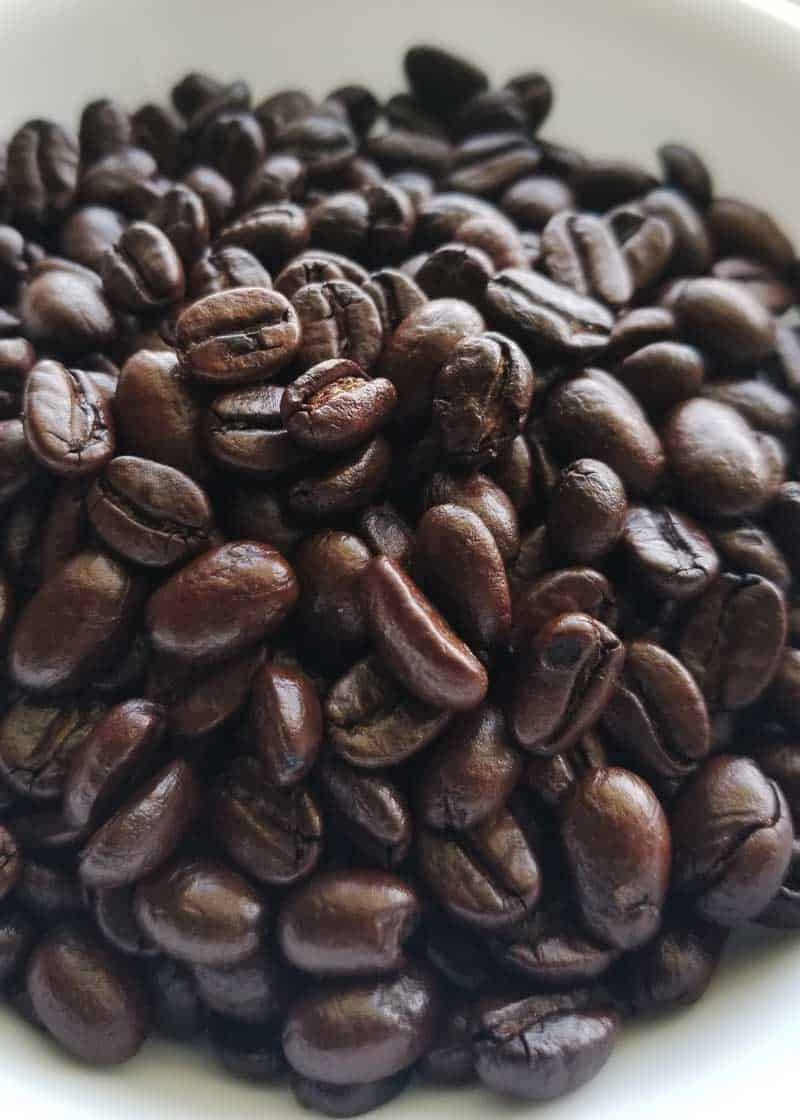
Pairing Yirgacheffe Coffee
The sweetness of Yirgacheffe coffee often means that the brew is served as a special treat. It pairs well when served with lighter, sweeter flavors.
It is great as a dessert or served along with breakfast for a bright start to your morning routine. The most popular pairings include a fruit-forward flavor to highlight the natural accents of the Yirgacheffe.
Some of the best flavors to pair with include:
- Chocolate
- Pancakes
- Lemon tarts
- Strawberry shortcake
- Doughnuts
- Fruit
- Blackberry cobbler
Where to Buy Yirgacheffe
Due to rising popularity, you can often find Yirgacheffe coffee in many traditional grocery stores like Walmart, Target, or Kroger. If you’re a coffee lover, you might prefer to choose brands that specialize in Ethiopian coffee. It might be fresher and sorted/roasted more consistently.
A quality Yirgacheffe coffee will have a clean, bright taste and will traditionally be wet-processed and slow roasted.
Some popular brands include:

Organically grown: Volcanica Coffee Company
- Green (unroasted) Yirgacheffe Beans (Fresh roasted Coffee)
- Single origin / organic: Yirgacheffe Beans by Ajuvo World Market
Unique Difference of Yirgacheffe
Yirgachefffe is a specialty coffee that provides a sweet, fruity alternative to other brews. This coffee also attracts drinkers that are looking to avoid big box brands.
The use of chemicals to treat coffee in Ethiopia is illegal, resulting in a strong following of organic coffee lovers. Those looking for fair-trade coffee options will be delighted by the wide variety of fair-trade brands on the market.
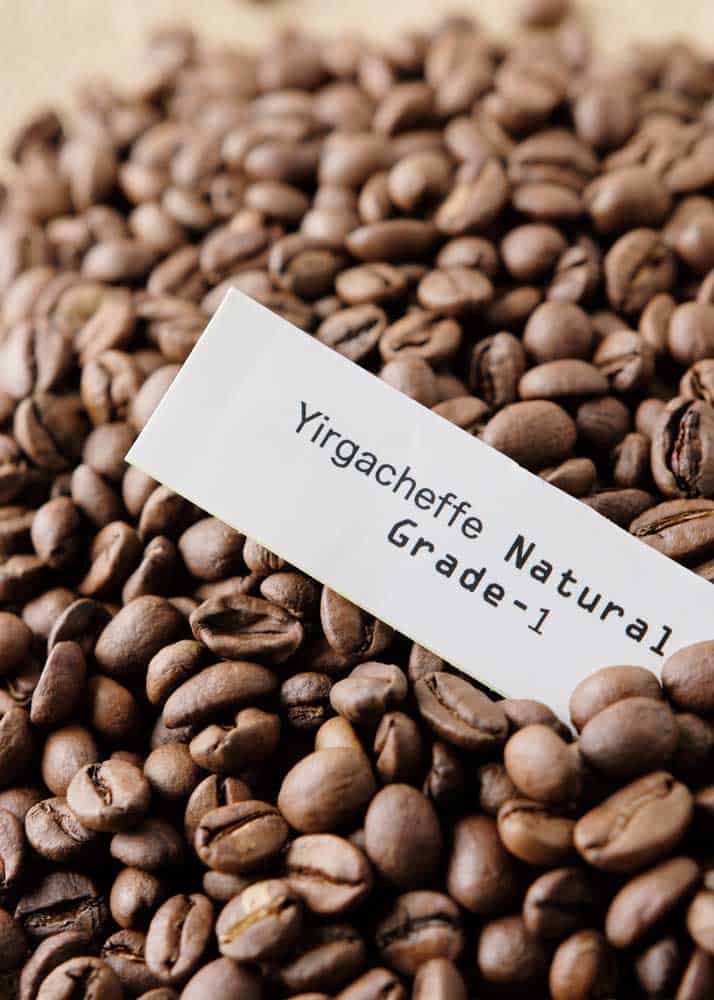
My Thoughts: Yirgacheffe Coffee
Over the past few weeks, I’ve been drinking some dark Ethiopian Yirgacheffe by Fresh Roasted Coffee. It is bold, with notes of honey, and lemon.
I didn’t love it at first sip. But I tried it a few more times and now it is a favorite bean and roast. I drink it black, like all my coffee. It has one of the most diverse flavor profiles that I’ve tried.
It was surprisingly difficult to find in Canada – at least from a reputable roaster. The Fresh Roasted Coffee Brand is available in both the US and Canada – and comes well-rated.
If you decide to give it a try, I recommend trying it a few times. It is probably different than your traditional brew – but I think you’ll find it’s worth it.
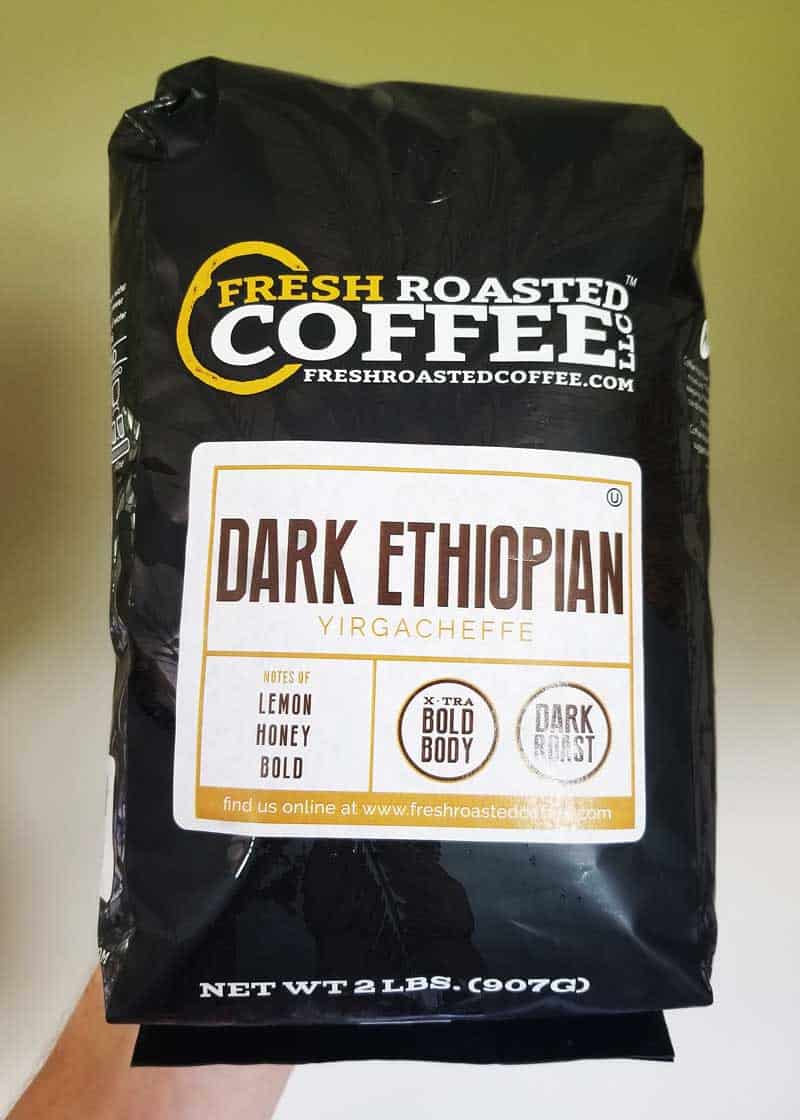
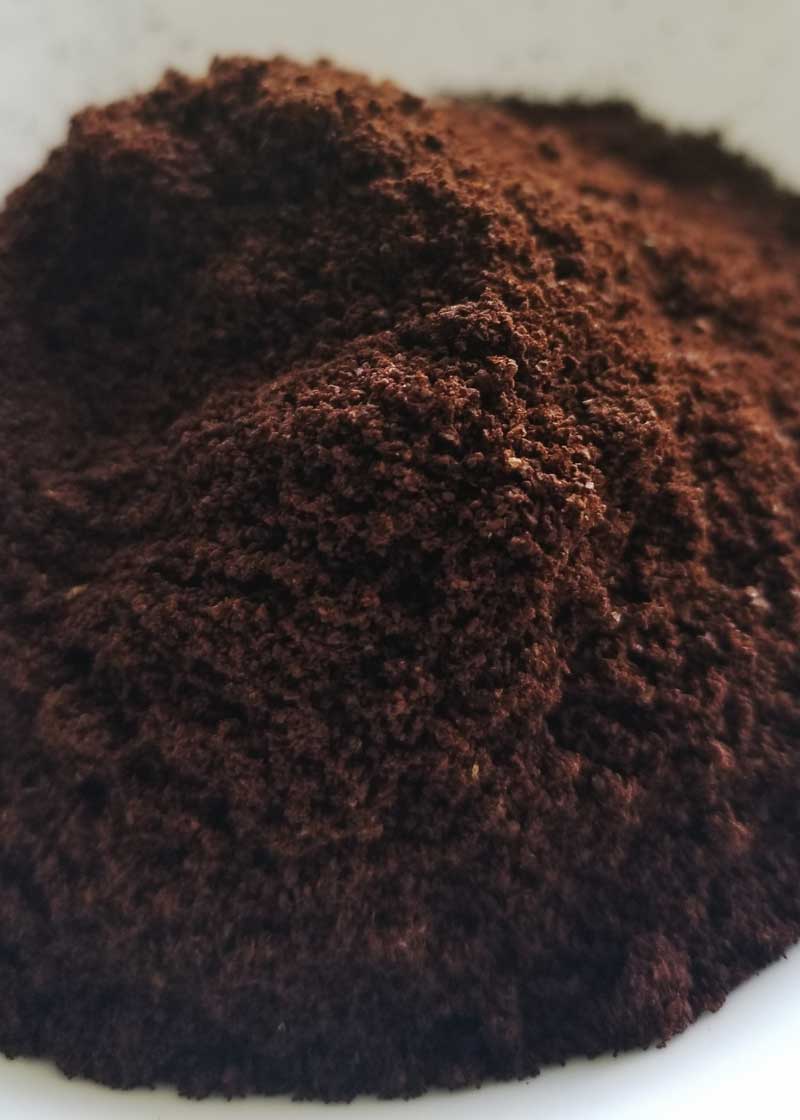
Your Turn
Have you tried Yirgacheffe? I would love to hear your thoughts below! Have a question? Let me know and I’ll do my best to answer it.
- About the Author
- Latest Posts
Dena Haines is a co-founder and blogger on EnjoyJava – and is working to make it the best coffee blog in the world.
She also blogs about travel at Storyteller.Travel and photography at Storyteller Tech. Dena is a partner at Storyteller Media, a publishing company she started with her husband, Bryan.

johnnyjohnny
Monday 6th of February 2023
i have been getting bored with coffee for a few years. i drink organic light roast, but it all tasted the same. i needed to order some more online but was stuck at the market needing to get some. the only light roast was not organic, but as a short term solution i got it. it was ethiopian yirgacheffe which i'd never had before. well, after brewing it and tasting it i had no clue coffee could taste this good. it was a supermarket chain brand (private selection), but fair trade. i've now become a fanatic trying to get more. an organic light roast whole bean i could find locally was at target, so i ordered some and picked it up, but was shocked at how it tasted just like the normal coffee i'd been drinking for years. the beans had some white residue down the middle of the bean as so many whole beans do (the private selection didn't) and i wonder if this was the difference. i'm now hoping to find a different brand that tastes as distinctive with light flavors as the private selection. i don't know if you have a clue why the huge difference in different suppliers of this coffee. i am also thinking of not requiring it be organic since chemicals and non-organic processing are not allowed in this region according to your article. any thoughts would be appreciated, though i may just stick to the private selection brand since it was so incredible. thanks.
Jim S.
Sunday 22nd of January 2023
I'm drinking some dark-roasted Yirgacheffe made by a pour-over right now and it is delicious. Great balance and depth. I love it!